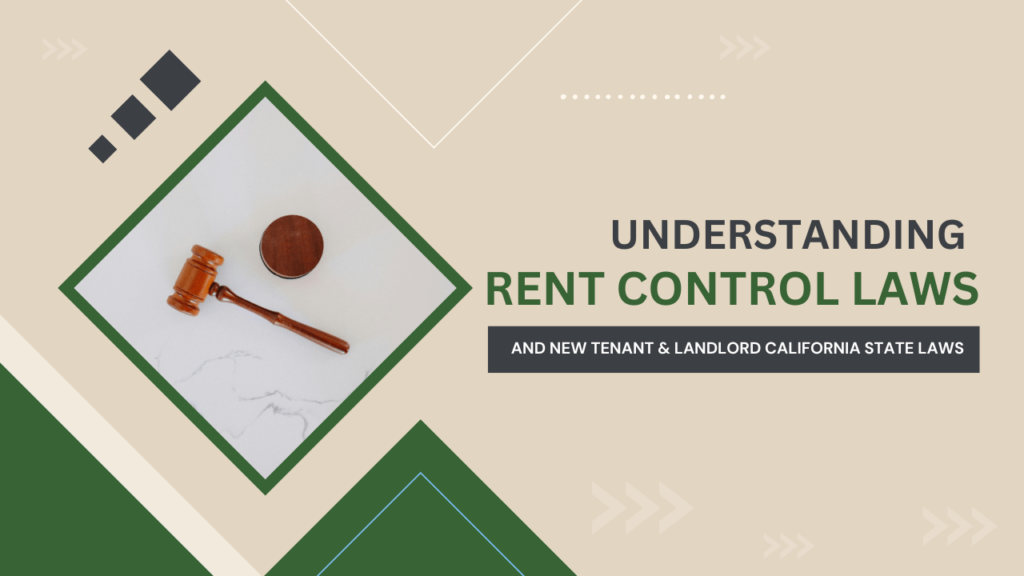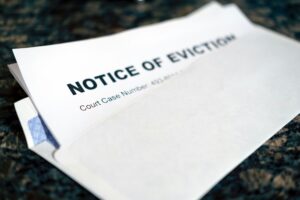
Rent control laws in Sonoma County are always shifting, and rental property owners must be aware of a list of new laws as 2025 gets off to a strong start. Late in 2024, we updated a published list of the Sonoma County Residential Tenancy Protections Ordinance, which you can reference here.
Thanks to our resources through organizations such as the California Apartment Association, we have been keeping up to date with all the new laws and new legal interpretations of these laws. They recently updated their guide to new rental laws, and we’re summarizing some of the most important laws that property owners need to know and understand.
Expanded Eviction Protections in Sonoma County
 By now, most rental property owners in Sonoma County are familiar with the Just Cause eviction laws that have been statewide for several years. There are some strict requirements in place regarding when you can evict a tenant and what kind of process you must follow in order to remove a tenant from your rental property.
By now, most rental property owners in Sonoma County are familiar with the Just Cause eviction laws that have been statewide for several years. There are some strict requirements in place regarding when you can evict a tenant and what kind of process you must follow in order to remove a tenant from your rental property.
New legislation has now given tenants extra time to respond to an eviction proceeding that has made its way to the courts.
This law, AB 2347, went into effect on January 1, 2025, and it means that property owners won’t be able to get to court as quickly as they once did. Instead of having five business days to respond to an eviction notice or a Summons and Complaint, tenants will now have 10 business days to respond. This provides residents with a bit more time and means the process might take a little bit longer. The law also clarifies the timeline for filing motions to strike the complaint, which is now between five and seven days after receiving notice.
In California courts, default evictions occur when tenants do not respond to the unlawful detainer lawsuit. This is usually the fastest way that property owners can achieve an eviction and get their property back. We often count on a tenant not responding. But, this new bill will prevent those evictions and give tenants more time to access legal help or prepare a defense to the pending eviction.
What does this law mean for owners like you when you’re evicting a tenant?
It means that those unlawful detainer lawsuits will take longer to resolve. Evictions will stretch on a little bit longer, thanks to the doubling of the time in which a defendant may respond to an eviction complaint.
There is some hope that the new laws won’t slow things down too much, however. That’s because AB 2347 could potentially streamline proceedings by allowing oral arguments in the form of objections and replies rather than written complaints and oppositions. Another part of this law mandates that hearings will need to be conducted within seven days unless there’s a good cause for an extension of time.
Updated Requirements Around Tenant Screening and Application Fees
AB 2493, which went into effect January 1, allows landlords and property managers to charge an application screening fee only if applications are accepted in the order in which they are received and only if the first application to meet the screening criteria is approved. This law also requires that you or your property manager provide the screening criteria to the applicant in writing when the application is requested.
At D & G Equity Management, we already provide standard rental criteria to prospective tenants before they apply. Nothing has changed much there. However, it’s no longer possible to collect numerous applications and then choose the application that owners feel is most qualified. If you want to collect an application fee during the screening process, you have to screen those applications one at a time in the order that they were received. You must accept the first application that fits all the screening criteria.
Tenant Protections: Reporting Rents to Credit Bureaus
There’s a new law in place that invites tenants to improve their credit by having on-time rents reported. AB 2747 requires that you, as the rental property owner, offer tenants the option of having their positive rental payment information reported to at least one nationwide consumer reporting agency. When you have a lease starting on and after April 1, 2025, you need to make this offer at the time you sign the lease and then at least once annually. For existing leases, as of Jan. 1, 2025, the offer of positive rental payment information reporting must be made no later than April 1, 2025, and at least once annually thereafter.
This is a law that could incentivize tenants to pay rent on time. If they opt to have their payments reported, they’ll want to make sure there’s good news to report. With this law on the books, owners also have the option to charge tenants a fee to cover the actual costs of reporting their on-time rental payments. This charge cannot exceed $10 each month, and it must go towards the cost of reporting the positive rental payments.
There are exemptions to this law, which you need to be aware of before you begin offering this to tenants. The most notable exception is that the law does not apply to owners of a residential rental building that contains 15 or fewer dwelling units unless both of the following apply:
- The landlord owns more than one residential rental building (number of units in each building does not matter), and,
- The landlord is a real estate investment trust, a corporation, or a limited liability company in which at least one member is a corporation.
Tenants do not have to accept your offer to report their scores. But if they do ask for this benefit, make sure you’re prepared to deliver.
Security Deposit and Providing Unit Photos

This new law requires landlords who collect a security deposit to take photographs of the unit at three separate points before and after a tenancy in order to let tenants know what the condition of the property is, and how their security deposit might be impacted. Here are the three times that you need to take and provide photos:
- Immediately before the tenants move in or at the start of a new tenancy.
- Within a reasonable time after the lease term ends and the unit is returned to the landlord, but prior to any repairs or cleaning.
- Within a reasonable time, after repairs or cleaning are completed.
As a landlord, you’ll be required to provide these photographs to your departing tenant. Beginning April 1, 2025, the landlord must take photographs of the unit within a reasonable time after the rental home is returned to the landlord. For tenancies that begin on or after July 1, 2025, you will have to take photographs of the unit immediately before or at the start of the tenancy.
Again – this is something we do anyway as professional Sonoma County property managers. This law is one that we’ve been complying with before it was required.
Accessory Dwelling Unit (ADU) Reforms
Renting out an ADU on an existing property can be a profitable way to earn additional rent and expand a real estate portfolio. Several new laws will provide flexibility and accessibility for ADUs.
- SB 1211 allows for more ADU opportunities on existing multifamily properties. Owners can add new ADUs, up to a number that’s equivalent to 25 percent of the existing units, and also up to eight detached ADUs. The total number of detached ADUs permitted will depend on how many units are on the existing multifamily property.
- AB 2533 strengthens the ADU Amnesty Program, which is a statewide initiative that establishes safety standards for local agencies when they’re assessing informal ADUs. Ultimately, this law aims to reduce fees for lower-income homeowners. It also requires cities to provide a checklist of standards upfront. This law leads to more transparency and affordability in the ADU process.
These are the most relevant new laws for rental property owners in Sonoma County. If you’d like to talk in
Fees and Notices
 Landlords and their agents cannot charge a tenant any fee for payment by check for rent or a security deposit. It also prohibits landlords and their agents from charging a tenant a fee for serving, posting, or delivering any notice as described. We know that a lot of us like to collect rent online. It’s easy and convenient. But, if tenants want to pay by check, you must allow it, and you cannot charge them for it.
Landlords and their agents cannot charge a tenant any fee for payment by check for rent or a security deposit. It also prohibits landlords and their agents from charging a tenant a fee for serving, posting, or delivering any notice as described. We know that a lot of us like to collect rent online. It’s easy and convenient. But, if tenants want to pay by check, you must allow it, and you cannot charge them for it.
After April 1, 2025, if a landlord or their agent charges a military service member a higher-than-standard or advertised security deposit, the lease agreement must include a statement about the amount of the higher fee and an explanation of why the higher security deposit is being charged. The law requires the additional amount of security deposit to be returned to the tenant after no more than six months if the tenant is not in arrears for any rent due during that period.
This is not a comprehensive list of the new laws taking effect, but we believe these are the most important things to know as you rent out a Sonoma County property in 2025. Let us help you stay in compliance. Contact us at D & G Equity Management.
